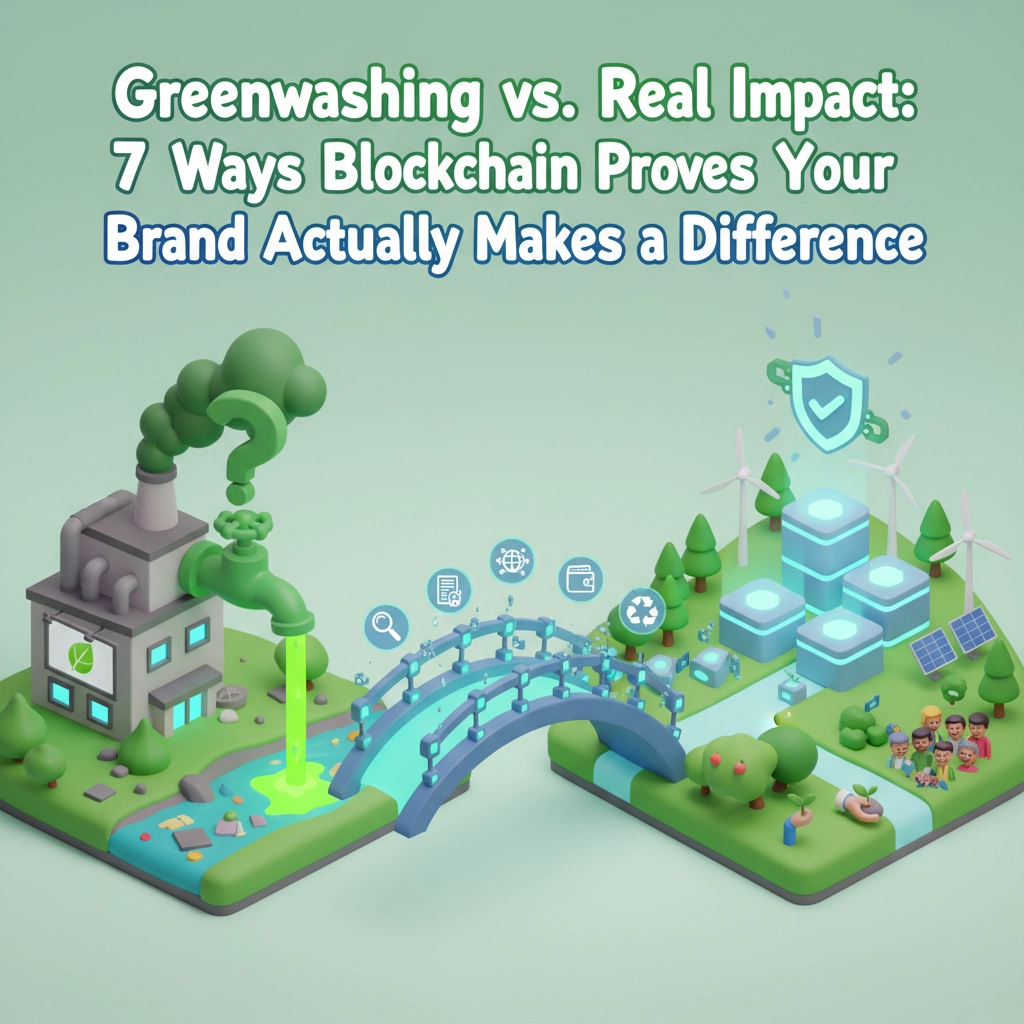Greenwashing vs. Real Impact: 7 Ways Blockchain Proves Your Brand Actually Makes a Difference

Let's be honest: consumers are tired of empty environmental promises. They're done with companies that slap a green leaf on their logo and call it sustainability. The era of unchecked greenwashing is ending, and blockchain technology is leading the charge toward genuine, verifiable impact.
Here's the uncomfortable truth for brands: your sustainability claims are about to be put under a microscope that never blinks, never forgets, and never lies. Blockchain doesn't care about your marketing department's creative interpretation of "eco-friendly." It only cares about facts: immutable, traceable, verifiable facts.
The engagement economy is shifting toward platforms that reward authentic action over hollow rhetoric. Companies like Zenko Protocol are pioneering systems where users earn tokens not just for participating, but for creating measurable, verified impact in the real world. This isn't just about gamification: it's about accountability at scale.
Immutable Environmental Records: Your Sustainability History, Permanently Etched
Traditional environmental reporting has a credibility problem. Companies cherry-pick data, massage metrics, and conveniently forget inconvenient truths when quarterly reports roll around. Blockchain eliminates this selective amnesia entirely.
Once environmental data hits the blockchain, it becomes part of an unchangeable historical record. Every carbon emission measurement, every waste reduction initiative, every renewable energy adoption: all permanently documented with timestamps that can't be altered, not even by the company that recorded them.

This immutability transforms how stakeholders evaluate sustainability claims. Instead of trusting polished annual reports, they can examine real-time, historical data that tells the complete story of a company's environmental journey: including the parts companies would rather forget.
The implications are massive: companies can no longer hide behind vague commitments or manipulated metrics. Every environmental action (or inaction) becomes part of a permanent record that follows them forever. This forces genuine commitment over performative gestures.
End-to-End Supply Chain Transparency: From Raw Materials to Your Doorstep
Supply chains are where most greenwashing happens. Companies make broad sustainability claims while conveniently ignoring questionable practices buried deep in their sourcing networks. Blockchain eliminates these blind spots by creating complete visibility across entire supply chains.
Every component, material, and manufacturing process can be tracked on an immutable ledger, creating a digital passport that follows products from raw material extraction to final delivery. Consumers scan QR codes and instantly access detailed histories: where materials originated, how they were processed, transportation methods used, and carbon footprints generated at each stage.
This transparency makes it impossible for brands to make false claims about sustainable sourcing. If a company claims its products are "ethically sourced," stakeholders can verify this claim by examining every step in the supply chain. No more taking corporate word for it: the blockchain provides the receipts.
The result? Companies must either commit to genuinely sustainable practices throughout their entire supply networks or face inevitable exposure when their claims don't match reality.
Automated Carbon Accounting: Real Numbers, Real Time, Real Accountability
Carbon accounting has historically been more art than science, with companies using convenient methodologies and estimated figures to paint favorable pictures of their environmental impact. Blockchain changes this by enabling automated, real-time carbon tracking that eliminates human manipulation.
Smart sensors and IoT devices feed emissions data directly onto the blockchain, creating continuous streams of verified environmental metrics. No more annual estimates: stakeholders can monitor carbon footprints in real time, seeing exactly when emissions spike or decrease and understanding the specific activities driving these changes.
This automated approach ensures carbon accounting reflects actual environmental impact rather than optimistic projections or carefully selected data points. Companies can't hide behind outdated baselines or convenient calculation methods when their actual emissions are continuously recorded and publicly accessible.
The financial implications are equally significant: automated carbon tracking enables dynamic carbon pricing and immediate accountability for environmental costs, creating strong incentives for genuine emission reductions.
Smart Contract Accountability: Automated Consequences for Environmental Commitments
Environmental commitments often lack teeth. Companies make bold sustainability pledges, then quietly abandon them when priorities shift or costs mount. Smart contracts eliminate this option by automatically enforcing environmental obligations.

Companies can encode specific sustainability targets directly into smart contracts, creating binding agreements that automatically execute predetermined actions when goals are met or missed. Miss your emission reduction target? The smart contract automatically triggers penalty payments to environmental restoration funds. Exceed your renewable energy goals? Bonus payments to employees or additional investments in green initiatives get automatically released.
This automation removes human discretion from sustainability reporting and creates meaningful consequences for environmental performance. No more empty promises: every commitment becomes a binding, automatically enforced obligation.
The psychological impact is profound: knowing that environmental commitments will be automatically enforced changes how companies approach sustainability planning, forcing realistic goal-setting and genuine resource allocation.
Blockchain-Based Eco-Certifications: Instant Verification of Environmental Claims
Traditional environmental certifications often rely on periodic audits and static documentation that can quickly become outdated or difficult to verify. Blockchain enables dynamic, instantly verifiable certifications that provide real-time insight into environmental performance.
Certifying bodies issue digital certificates directly onto the blockchain, providing stakeholders with immediate access to certification details, including specific criteria met, methodologies used, and complete auditing histories. These certifications can update automatically as environmental performance changes, providing dynamic rather than static assessments.
This system creates direct links between certification claims and verifiable evidence, allowing stakeholders to examine not just whether a company is certified, but exactly how it earned and maintains its certifications. The transparency makes it impossible to exaggerate or misrepresent environmental credentials.
More importantly, blockchain-based certifications can trigger automatic actions: supply chain partners can automatically verify supplier certifications before placing orders, and consumers can instantly validate environmental claims before making purchasing decisions.
Decentralized Data Verification: Multiple Independent Sources Confirming Environmental Truth
The biggest challenge in environmental reporting has always been data integrity. Who verifies the verifiers? How do stakeholders know that environmental data hasn't been manipulated before reaching the blockchain? Decentralized oracle networks solve this by requiring multiple independent sources to confirm environmental data before recording it.

Instead of trusting single data sources, decentralized verification systems aggregate information from multiple sensors, satellites, and monitoring systems, creating consensus-based environmental records that are virtually impossible to manipulate. If emission monitoring sensors show conflicting readings, the system flags discrepancies and requires additional verification before recording final metrics.
This approach addresses the critical "garbage in, garbage out" problem that has plagued environmental data systems. Even if individual data sources are compromised, the decentralized verification process ensures that only accurate, consensus-verified information reaches the permanent blockchain record.
The result is unprecedented confidence in environmental data, eliminating the possibility of systematic manipulation while maintaining real-time monitoring capabilities.
Tokenization of Environmental Assets: Creating Markets for Verified Impact
Perhaps the most powerful application of blockchain for environmental accountability is the tokenization of environmental assets: carbon credits, biodiversity offsets, renewable energy certificates, and other representations of environmental value. This creates transparent, tradeable markets for verified environmental impact.
Unlike traditional offset programs that often lack transparency and suffer from double-counting issues, blockchain-based environmental tokens provide complete traceability from generation to retirement. Every environmental token carries a complete history: how it was generated, who has owned it, and exactly how it was used to offset environmental impact.
This transparency eliminates many of the credibility issues that have plagued traditional carbon markets while creating new financial incentives for genuine environmental action. Companies can tokenize their environmental improvements, creating new revenue streams while providing transparent proof of their sustainability efforts.
The implications extend beyond individual companies: entire ecosystems of verified environmental impact can emerge, with platforms like Zenko Protocol enabling users to earn tokens for activities that generate measurable, verified environmental benefits.
The End of Greenwashing Era
These blockchain capabilities converge to create an environment where greenwashing becomes not just unethical, but technologically impossible. When every environmental claim is backed by immutable records, automated verification, and real-time monitoring, companies must deliver genuine impact or face immediate, transparent exposure of their shortcomings.
The shift creates massive opportunities for companies willing to embrace authentic sustainability. Early adopters gain competitive advantages through enhanced credibility, consumer trust, and access to new token-based incentive systems. Meanwhile, companies clinging to greenwashing strategies face inevitable obsolescence as stakeholders demand: and can verify: genuine environmental commitment.
The engagement economy rewards authentic action over empty promises. Platforms enabling users to earn tokens for verified environmental impact are creating new models where sustainability becomes financially rewarding for individuals and organizationally essential for brands. This isn't just the future of environmental accountability: it's the present reality for companies ready to prove their impact rather than just claim it.

